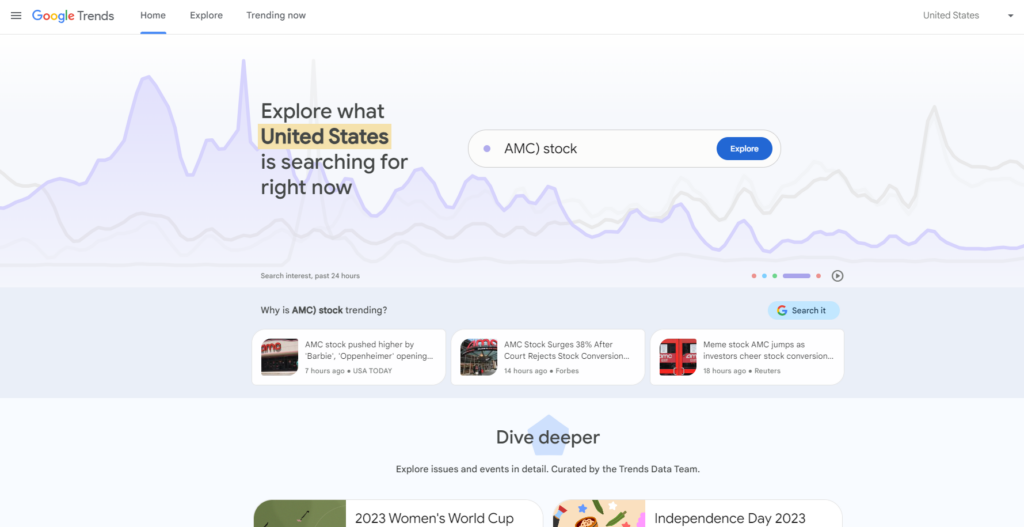Crafting captivating content for a blog is an art form in itself. It requires creativity, insight, and a firm grasp of your subject matter. Yet, regardless of how well-written your content may be, it’s unlikely to reach its full potential without the strategic use of SEO keywords. This brings us to keyword research, an often under-appreciated but crucial aspect of maintaining an effective blog presence. This comprehensive guide will reveal why this process is so important and unravel the mystery of how to master the keyword research process for your blog.
What Is Keyword Research?

Let’s start by addressing the elephant in the room: ‘What is a keyword in SEO’?
Keyword research is a method used by SEO professionals that involves identifying popular words and phrases people enter into search engines while seeking content similar to what you can offer. These keywords give you insights into what your audience wants so you can tailor your offerings accordingly.
The techniques involved go beyond merely compiling a list of related words or using tools to find the best keywords for SEO; it requires carefully analyzing data trends and competition levels concerning those terms.
Simply put, it’s about understanding distinct language patterns followed by different internet users, gauging their intent, assessing the feasibility of achieving high rankings for specific phrases (named keywords), and then tactfully incorporating these findings into your website or blog content creation strategy called SEO research keywords.
Ultimately this helps search engines associate specific terms with your online property enhancing its visibility when users perform related searches.
In short, keyword research involves understanding what “language” your potential customers are using while searching online so that you can optimize your content around these phrases. The goal is to ensure that when someone types these queries into Google or any other search engine, they find your insightful posts staring right back at them!
Why Is Keyword Research Important for Your Blog?

Renowned for being one of the core components of Search Engine Optimization (SEO), keyword research is essential to your blog’s success. Harnessing the power of this method provides you with multifaceted advantages. Next, let’s delve into these aspects.
Marketing Trend Insight
Understanding the significance of keywords equates to unmasking user behavior and current marketing trends. By doing adequate keyword research for your blog, you know what the target audience is searching for and which topics are gaining traction.
It’s essential to analyze specific phrases or ‘keywords’ that internet users commonly input into search engines when browsing a topic related to your content. This process helps lay down a robust foundation for your SEO strategy by pinpointing which areas demand more attention, giving you insight into prospective successful post options that will likely draw attention.
Traffic Growth
Segueing aptly from our discussion on marketing trend insight, increasing organic traffic plays another critical role in why keyword researching is crucial in blogging.
An article containing well-researched keywords will rank high in Google’s search results, optimizing visibility among netizens looking up relevant content. As a result, it increases your chances of reaching out to those who matter – both potential and existing readers who would be interested in what your blog offers.
In essence, highly ranked pages due to effective keyword use often lead to increased web visits, enhancing traffic, recognition, and credibility over time.
Customer Acquisition
Finally, yet important is customer acquisition. Yes! You heard this right; blogs have customers too! Whether it’s a product review blogger hoping their readers will buy through their referral links or experts trying to attract traffic toward their services page – everyone needs customers!
Perfectly executed keyword research lets you position yourself effectively within the market sector correlated with what you offer as a blogger. Presenting relevant content boosts engagement levels amongst readers turning them into loyal customers.
Remember that providing valuable information based on researched best keywords can pique interest by bridging gaps between seeker intent and content provision—a match made in digital heavens if played right!
To sum up, Keyword research remains an indispensable facet of creating a thriving blog driven by sustainable organic growth. It facilitates market trend understanding, improves online visibility leading towards enhanced traffic influx, and aids in winning over reliable clients—the Holy Trinity establishing blogging success!
(TL;DR) How to Use Keywords in Your Blog Content Strategy

Let’s dive straight into the crux of mastering keyword research for your blog.
What to Do
- Identify the right set of keywords: Begin by understanding ‘what is a keyword in SEO’ and then discover the best SEO keywords that align with your blog’s niche.
- Incorporate long-tail keywords: These are more specific, less competitive, and often boast better conversion rates.
- Utilise Keyword Research Tools: Ranging from Ahrefs Blog Keyword Research to Google AdWords Keyword Planner, these tools offer insights on “keyword search volume” and help you unearth high-ranking keywords.
- Factor in Relevance & Authority: The relevance reflects whether chosen keywords meet user intent. At the same time, authority depicts how well your blog might rank for them.
- Engage with theme clusters: They are groups of semantically related keywords that work together to boost topic visibility.
What to Avoid
As crucial as it is to grasp what actions foster excellence in keyword-focused content strategy, discerning missteps equally holds paramount importance.
- Keyword Stuffing: Laden, your blog posts with excessive instances of the targeted keywords distort the reading experience and could incur SEO penalties.
- Neglecting ‘Long-Tail’ Keywords- Remember, they hold immense potential in driving traffic when effectively combined with ‘head’ terms.
- Ignoring Site’s Authority: If your site doesn’t have a strong backlink profile or domain authority, aiming for highly competitive top-tier keywords might not be rewarding.
- Selecting Irrelevant Keywords: Despite high search volumes or low competition, if a keyword isn’t aligned with user intent or doesn’t resonate with your blog’s content, its efficacy diminishes drastically.
Ultimately, the successful application of keyword research for blogging demands balancing relevance, search volume, and difficulty level while adhering persistently to an engaging writing style that caters effortlessly to reader expectations.
How does keyword research help when writing a blog post?
The power of keyword research truly shines through when writing a blog post by guiding content creation and ensuring relevancy to the target audience. This practice serves as the backbone to deliver sophisticated pieces that capture both user interest and improve visibility in search engine rankings.
Strategic Content Creation
To begin with, it’s all about strategic content creation. By doing keyword research for your blog posts, you’ll know precisely what expressions your potential readers search on the web. For instance, tools such as Google Trends or Ahrefs Blog Keyword Research can provide insights into currently favored keywords related to your topic, forming an ideal foundation for your text.
Enhancing Relevancy
Secondly, identifying suitable keywords ensures relevance. Have you ever wondered why certain sites appear at the top of your search results? It’s primarily based on solid SEO practices, including smart use of relevant keywords within their content. Your blog post will increase the chance of being visible in these coveted spots if it includes the terms users type while searching.
Improved Organic Traffic
Lastly, it’s crucial to note that good keyword utilization contributes significantly towards organic traffic growth. This refers to unpaid traffic that comes directly from search engines. Keywords for blogging chosen wisely can potentially catapult your organic site visits drastically — leading not only to increased impressions but even conversions.
In conclusion, adopting mindful keyword research during blog content generation optimizes visibility, underpins relevancy, and paves the way towards augmenting organic traffic inflow — a recipe for success in any digital marketing playbook.
Elements of Keyword Research

True mastery over keyword research for blogging can be attained by comprehending three critical elements: relevance, authority, and volume.
Relevance
The first step is understanding the importance of selecting relevant keywords. These are terms directly related to your industry and your audience’s interests. Irrelevant words might momentarily boost traffic but won’t lead to meaningful interactions or conversions.
To find the best keywords for SEO, ask yourself the following questions:
- What subjects do you frequently cover?
- Which topics do readers engage with most?
- What industry news or trends are currently popular?
Using tools like Google Trends can also provide insight into what is current and sought after in your niche. Remember, choose relevancy confidence over broad exposure when planning your blog keywords.
Authority
Next comes authority – a slightly abstract concept often overlooked in blog keyword research. Keywords with high authority seem tempting initially. However, vying for space amongst giant corporations will prove fruitless if you’re a small operation. Your content might disappear within the sea of other search results.
Instead, opt for targeted “long-tail” keywords that comprise two to five words. For instance, rather than targeting ‘fitness tips’ as a keyword, you could use ‘home fitness tips during quarantine.’ These long-tail phrases are more specific and allow smaller blogs to rank higher due to lower competition from significant market players.
Recognize that seeking out these unique niches grants better visibility toward an engaged audience searching specifically for your content. Try using various free keyword research tools online, such as Google AdWords Keyword Planner and Moz Blog Keyword Research tool, to help discover these hidden jewel-like longer tail phrases.
Volume
Lastly, this triumvirate stands for volume – illustrating how many users actively search for specific terms each month. While it holds temptation in large numbers, note that aiming too commonly used terms increases competition substantially, making appearing atop search inquiries arduous without considerable seo research keywords effort spent optimizing your blog.
As an alternative approach while still focusing on the volume popularity aspect: try fine-tuning your focus onto mid-volume searched phrases inherently tied up within your niche sector, offering adequate traffic potential while not heralding massive competition statistically improbable odds challenge-wise.
Master Keyword Research for Your Blog – Step-by-Step Guide

Success in blogging often lies in successfully navigating the nebulous world of SEO, and central to this is the correct utilization of keywords.
Step 1: Make a list of important, relevant topics based on what you know about your business.
Rather than diving straight into keyword research, it’s more prudent first to identify pertinent topics related to your blog or business. These core subject areas form the backbone of your SEO strategy by supplying context to your targeted keywords. Sit down and brainstorm topics you believe are essential to your target audience while highly relevant to your product or service.
Remember, you needn’t limit yourself either. Even tangentially related themes can become goldmines if given proper attention during subsequent steps like filling topic buckets with corresponding keywords. Always consult ‘what is a keyword in SEO,’ as this knowledge will prove beneficial down the line.
Step 2: Fill in those topic buckets with keywords.
With your broad subject areas sketched out, it’s time to refine these into potential search queries – your raw keyword data (‘find best keywords for SEO). It’s often helpful at this stage to put yourself into the mindset of a would-be visitor: what sort of questions might they input into a search engine? These presumptive inquiries form the bedrock upon which our thematic mounds (topics) will be built.
For instance, if one of my key subjects is “meal planning,” I might consider phrases such as “easy meal plans” or “meal planning tools.” Creatively exploring each topic from multiple perspectives should yield an exhaustive selection worth sifting through.
Step 3: Understand How Intent Affects Keyword Research and Analyze Accordingly.
Gone are the days when stuffing as many high-ranking keywords into an article would automatically boost rankings. Modern search algorithms incorporate user intent heavily (‘seo research keywords’), reevaluating how specific terms relate within broader contexts owing to this shift.
In essence, understanding whether searchers look for information (informational intent), want to visit a specific site (navigational intent), or wish to make a purchase (transactional intent) allows us to better present our content in ways catering explicitly towards fulfilling these discrete needs.
Step 4: Research related search terms.
Moreover, researching cognate phrases can further bolster our scope over targeted subject areas. Evidence of this process manifests itself every time we type into Google’s search engine—the suggestions provided below are based on other popular searches conducted by users sharing some linguistic DNA with our query.
By looking for these suggested alternatives and incorporating them organically within our existing pile, we stand armed with an expansive arsenal ready at our disposal.
Step 5: Use keyword research tools to your advantage.
Finally, yet important, comes taking aid from numerous online utilities designed explicitly for such pursuits – keyword research tools. This software helps cut down possible choices through intelligent automation. It provides deeper insights like checking keyword search volume, thereby improving upstream decision-making regarding their implementation during content creation.
It also let’s you start with seed keyword showing you more keyword ideas.
These programs, like Google AdWords Keyword Planner or Ahrefs, streamline sophisticated metric calculations behind readable interfaces obscuring all laboriousness while concurrently sifting away any irrelevant options passing initial eyeball tests.
How to Analyze and Choose Keywords for Your Blog

In the labyrinth of ranking higher and making your blog more visible, keyword strategy plays a crucial role. Here’s a six-step guide on how to analyze and cherry-pick the best keywords for your blog.
Step 1: Use Google Keyword Planner to Cut Down Your Keyword List
The initial step in streamlining your list involves using the Google Keyword Planner tool. This helpful resource assists you in narrowing down your compiled list based on factors such as competition, relevance, traffic scores, or Cost Per Click (CPC). It can prove beneficial for SEO research keywords as well.
Having numerous potential keywords is one thing, but it’s another task to sift through them effectively. Google Keyword Planner simplifies this daunting process by showing critical statistics for informed decision-making.
Step 2: Prioritize Low-Hanging Fruit
Once you have trimmed your keyword list, your next move should be recognizing ‘low-hanging fruit.’ These moderately high-volume yet low-competition keywords present an opportunity for quick SEO wins. The trick lies in identifying what is unique about your blog content and which keywords align with those aspects.
But remember, while chasing low-competition keyword themes might seem appealing because it might get quicker results, focusing only on these would mean missing out on opportunities for sustained long-term growth-providing search terms. Striking a balance is critical!
Step 3: Check the Monthly Search Volume (MSV) for Keywords You’ve Chosen
Monthly Search Volume (MSV) shows how often users look up a particular keyword within a month. Validating MSVs via trusted tools like Moz or Ahrefs gives you accurate estimates of user interest revolving around specific words or phrases. This can be particularly useful when checking keyword search volume.
Understanding where each term lies on the scale of demand will guide you towards two things — what searchers want and how hard it could be to rank higher with those terms.
Step 4: Factor In SERP Features As You Choose Keywords
As modern-day SEO evolves beyond simple text matches and explores semantic relationships between searches and results pages, SERP (Search Engine Results Page) features become increasingly important. Today’s SERPs offer more than traditional organic results like local packs, snippets, and other niche-related features.
As part of your ‘how to do keyword research’ quest furthers itself, considering these SERP features while choosing keywords significantly amplifies visibility opportunities.
Step 5: Check For A Mix Of Head Terms And Long-Tail Keywords In Each Bucket
Choosing broad terms already delves deeper into long-tail keywords linked with those head terms. They remain unhampered by intense competition compared to their broader counterparts, although they may have lower search volumes individually.
These blends of head terms and long-tail versions form coherent clusters that radiate topic authority signaling search engines about the depth and breadth of the covered content.
Step 6: See How Competitors Are Ranking For These Keywords in Search Engines
After harvesting potential SEO goldmines from steps one through five comes competitor analysis using competitors’ keywords free online tool options.
Examining competitor rankings gives you insights into their chosen words, target audience segments, and tactics they adopted. Successful ones and blunders did unknowingly, which could later be advantageous for you as cautionary tales! Through competitor rankings observing how external sites link back to these ranked blogs may unravel
Keyword Popularity & Difficulty Analysis

Keyword popularity and difficulty reflect two pivotal concepts in keyword research for your blog. Intrinsically linked, they determine how often a specific term is searched (popularity) and how challenging it would be to rank highly for that query (difficulty). Understanding these factors can boost your SEO strategy and push your blog closer to your objectives.
Popularity generates insight into customers’ current preferences. It assesses terms through search metrics like monthly search volume or MSV. An exceptional tool to check keyword search volume is Google AdWords Keyword Planner, which provides detailed insights about keyword popularity.
On the other hand, understanding keyword difficulty means being aware of the competition level for ranking high on Search Engine Results Pages (SERPs) for specific keywords. As a rule of thumb, more popular keywords are generally more challenging to rank for owing to increased competition.
Knowing the difficulty assists in deciding whether it’s feasible to target specific keywords given your available resources and goals. You should assess where you have better opportunities while you strengthen your website authority – hence often, starting with less competitive fields could prove beneficial.
Alternative Ways to Estimate the Keyword Difficulty
While using an SEO tool like Ahrefs or Moz Explorer will give you direct data about keyword difficulty estimations, what if you desire alternative ways beyond such platforms? Here are some unconventional but effective methods:
- Manually researching SERPs: Execute a search query and analyze the first page’s results. This might present a difficult domain if it seems dominated by authoritative industry leaders.
- Assessing backlink profiles: Using free tools such as Ubersuggest can enable scrutiny of competitors’ backlink profile, which contributes heavily to SERP rankings.
- Social Media Engagement: Observing how many shares or comments content receives on social media can indirectly indicate potential ranking ability, especially when engagement levels are impressive across multiple channels.
- Checking Domain Authority: Websites with higher domain authority tend to rank better, so researching this criterion should factor into estimating keyword difficulty.
Conclusively, analyzing both populist appeal and associated struggle enables informed decision-making and enhances multifaceted strategy development that invariably leads to optimal results in one’s blogging journey!
Think of Keywords as Topics (the Content Hub Model)
In standard keyword research, often the focus is on isolating specific words or phrases. However, embracing the Content Hub model opens up a novel approach – considering keywords as broader topics.
The rationale behind this pivot lies in how search engines have evolved. Google, for instance, now better understands query context and content relevance, thanks to its advancements in artificial intelligence and machine learning, such as Google’s RankBrain algorithm. Consequently, it recognizes the thematic consistency across a page or website versus isolated instances of specific keywords.
Let’s discuss how to implement this concept into your blog keyword strategy.
To start with:
- Delve deeper into SEO research keywords.
- Look for broad themes relevant to your blog’s niche rather than mere individual terms.
- Consider these themes “content hubs,” around which numerous interrelated posts or pages revolve.
For instance, if you run a health-focused blog dealing with holistic living practices, one potential content hub is ‘organic food.’ Subtopics from this hub might cover aspects like ‘benefits of organic food,’ ‘how to switch to an organic diet,’ or ‘cost-effective ways to buy organic products.’
Next is organizing these interrelated pieces coherently for readers and search engines. Ease of navigation should always be top-of-mind when planning your site architecture around these thematic clusters. Ensure related articles are conveniently interconnected through internal links – guiding visitors smoothly through different layers of information based on their interest level.
But the practical organization isn’t sufficient; remember that each piece orbiting the central theme must retain high relevance and authority—two values critical in keyword selection and ranking higher on SERPs.
Finally, regularly revisiting and updating your established content hubs is vital too. Keyword popularity may fluctuate along with consumer interests, meaning topic demands also evolve. Such updated tweaks ensure your blog remains timely while providing ample opportunities for targeted long-tail keyword insertion. This tactic is essential to cater to specific user queries and drive considerable traffic growth toward blogs.
Thinking about keywords more holistically as subjects rather than single entities allows for more strategic blogging keyword research while enhancing readership engagement—an ideal win-win!
So start rethinking your approach today: Treat those SEO research keywords not just as stand-alone terms but as multidimensional topics powering delightful digital journeys for all prospective users lucky enough to find themselves within your captivating content hubs.
Use the Focus Keyword (When Relevant)
This concept is a primary term or phrase representing your blog content best. For example, if our article revolves around “keyword research blog,” this becomes our focus keyword. However, remember that the focus keyword usage should always sound organic within the content.
The first part of effectively leveraging your focus keyword is determining what it should be – which often takes considerable thought. Finding the best keywords for SEO requires a deep understanding of your content’s purpose, audience interest, and choice of topics.
Once determined, there are strategic ways to optimize its value:
- Placement: Your focus keyword should ideally appear in critical sections, including the title tag, URL slug, and meta description, within your first paragraph or at least early in the content.
- Density: While there’s no hard and fast rule about frequency, it’s advisable not to overuse keywords as this can result in ‘keyword stuffing’ – an approach Google penalizes. Instead, aim for natural usage based on word count length.
- Variety: Try using variations of your primary keyword – synonyms or related phrases could also work well without disrupting readability or looking spammy.
- Relevant Images/Alt text: Any images used within your blog post provide another opportunity for implementing relevant keywords within their descriptive alt-text tags.
Remember though: relevancy is critical. While inserting high-traffic keywords into every post you write to boost rankings might be tempting, they will only help if they’re pertinent to your blog’s context and audience.
Using relevant SEO research keywords and focusing on user queries aligns with Google’s push toward topic-based relevance instead of simple string matching. Thus aligning user search intent with appropriately focused keywords drives successful optimization strategies.
Rest assured, whether you’re adopting Moz blog keyword research techniques or experimenting with Ahrefs blog keyword research tools – keeping ‘relevance’ at front-of-mind during any activity associated with your ‘focus keyword’ will serve your SEO objectives well!
What About LSI Keywords?
LSI, or Latent Semantic Indexing keywords, are terms and phrases closely related to your blog’s primary keyword. They’re a critical facet of effective keyword research for blog content, offering a way to enrich your text and make it more relevant for readers – and search engines.
Often misunderstood, LSI keywords are more than just synonyms of your primary keyword. They provide additional context, supporting the overall topic of your content. For instance, if you were writing about ‘apple,’ LSI keywords could help distinguish whether you meant the fruit or the tech company.
Integrating these keywords in blogs boosts semantic richness, making your posts richer and appear more organically in search results while avoiding an oversaturated repetition of one keyword. Consequently, this acts as a catalyst for enhanced visibility and improved SEO rankings.
Turning to practicality, implementing LSI keywords is smoother than you might imagine. Keyword research tools offer invaluable insights into trending and related terms which act impeccably as LSI keywords.
Here’s an organized breakdown:
- Identify potential LSIs by considering context-relevant terms.
- Use specialized tools such as Google Trends or Ahrefs for Blog Keyword Research.
- Evaluate how competitors leverage LSIs.
- Seamlessly integrate identified LSI keywords without disrupting the natural flow of content.
In essence, smooth integration of well-researched LSI Keywords steers away from over-repetition, allowing wider reach among various search intents seeing as many users may utilize different yet semantically connected query phrases, thereby significantly contributing towards an optimized keyword research strategy for your blog post composition endeavors!
Keyword Research Frequently Asked Questions

Undoubtedly, mastering the art of keyword research for your blog involves a steep learning curve. I will address some common queries you might have as you embark on this exciting journey.
Understanding Keyword Themes
Understanding how SEO research keywords are logically grouped together is to comprehend keyword themes fundamentally. Theming enables search engines like Google to link related content, enhancing the user experience by presenting them with highly relevant results.
SEO has evolved beyond targeting individual words. Today’s savvy webmaster realizes the importance of building content around the right keywords and broad terms encapsulating their particular niche.
Consider “keyword in SEO” a broad topic for building relevant subtopics or smaller keyword clusters. This approach mirrors natural human behavior more closely than rigidly following a single-word strategy, significantly improving page ranking potential.
For instance, if you manage a fashion blog:
- A themed approach would look like this:
- Central Theme: Fashion Trends
- Sub Themes (Clusters): Summer Fashion Tips, Winter Outfit Ideas, Sustainable Fashion Brands
- An un-themed approach would target isolated terms such as ‘Fashion trends’ or ‘Winter outfits.’ This lacks context sensitivity when compared to the first case.
Practical usage of thematic keywords strikes a fine balance between relevance, volume, and authority, three vital elements intrinsic to successful keyword research for blogs.
What Are The Best Keywords for Blogging?
Identifying “the best” keywords for blogging isn’t an exact science. What works wonders for one blog may fall flat for another! However, some guiding principles remain universally useful when hunting down profitable keywords.
Competitor analysis is an invaluable place to start. Acquiring competitors’ keywords via free tools aids in understanding patterns behind successful content within your field and inspires original keyword ideas for your blog. But remember not to blindly imitate competitors’ strategies – injecting your unique angle into this process is imperative!
A simultaneous exploration of high-volume search phrases yields insights about popular subjects people are passionate about within your domain using resources like Google Trends, Ahrefs, Moz, or Semrush.
Head over towards long-tail phrases (3-5 words) that specifically focus on reader intent. These often exhibit lower competition while drawing targeted traffic with higher chances of conversion like “Ahrefs blog keyword research.”
Finally, yet importantly: Remember that SERP features should also factor in during this exercise, ensuring increased visibility even amidst stiff online competition.
So ultimately, rather than searching exhaustively through numerous ‘how-to guides,’ adopting this comprehensive multi-vector approach ensures you unequivocally succeed at finding not just good but the very best keywords for blogging consistently!
What is the best keyword research tool for blogging?

Finding the perfect keywords is essential in your quest for superior blog content and high search engine rankings. There are several tools available that can assist you in this SEO journey. To streamline your efforts and find keywords yourself, I’ve picked out five of the most efficient keyword research tools used by mavens in the industry.
SEOwind for Blog Keyword Research

SEOwind is a long-form AI Writer based on in-depth SEO and content research. Although the tool doesn’t help find seed keywords, once you know what you’re after, it can greatly help you. It identifies keywords top SERPs rank for in the top 30, with search volume above 10. It is a goldmine of the data delivered to you on a silver plate.
Ahrefs for Blog Keyword Research

Ahrefs is indisputably one of the top-notch tools for comprehensive keyword analysis. It’s deemed the best free keyword research tool by many digital marketers. With a robust database, Ahrefs provides a rich wellspring of noteworthy words and phrases relevant to your niche or subject matter. Importantly, it offers keen insights into competitor performance, allowing you to counter their strategies more effectively.
Moz for Blog Keyword Research

Moz has earned its stripes with an intuitive interface and precise metrics. Counted amidst competitors’ keywords-free tool options, Moz offers impressive features such as “Keyword Difficulty” to gauge competition levels and “Organic CTR” to project potential traffic influx. Whether you’re dipping your toes into blog writing or have years under your belt, Moz makes keyword discovery uncomplicated yet highly effective.
Google AdWords Keyword Planner

Google’s own AdWords Keyword Planner deserves mention owing to its seamless integration with Google’s vast data troves; after all – who knows their algorithms better than Google itself? You can find the best keywords for SEO based on numerous factors, including location, language preference, and more. However, remember it primarily targets ad campaigns and lacks some granular details other dedicated tools might offer.
Google Trends

Google Trends presents an exciting dimension to your blog keyword research by displaying patterns over time for chosen keywords. It illuminates shifts in attention span among online users, which can be valuable evidence when evaluating potential topic buckets. Another instrumental feature is its ability to compare multiple terms side-by-side, providing comparative analytics at a glance.


